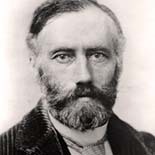 William Quan Judge (April 13, 1851 – March 21, 1896) was an Irish-American mystic, esotericist, and occultist, and one of the founders of the original Theosophical Society. He was born in Dublin, Ireland. When he was 13 years old, his family emigrated to the United States. He became a naturalized citizen of the USA at age 21 and passed the New York state bar exam, specializing in commercial law.
William Quan Judge (April 13, 1851 – March 21, 1896) was an Irish-American mystic, esotericist, and occultist, and one of the founders of the original Theosophical Society. He was born in Dublin, Ireland. When he was 13 years old, his family emigrated to the United States. He became a naturalized citizen of the USA at age 21 and passed the New York state bar exam, specializing in commercial law.
A vigorous, imaginative, and idealistic young man, he was among the seventeen people who first put the Theosophical Society together. Like Helena Petrovna Blavatsky and Henry Steel Olcott, he stayed in the organization when others left. When Olcott and Blavatsky left the United States for India, Judge stayed behind to manage the Society’s work, all the while working as a lawyer.
The United Lodge of Theosophist declaration formulated by Robert Croby using the phraseology of William Q. Judge:
DECLARATION
The policy of this Lodge is independent devotion to the cause of Theosophy, without professing attachment to any Theosophical organization. It is loyal to the great Founders of the Theosophical Movement, but does not concern itself with dissensions or differences of individual opinion.
The work it has on hand and the end it keeps in view are too absorbing and too lofty to leave it the time or inclination to take part in side issues. That work and that end is the dissemination of the Fundamental Principles of the philosophy of Theosophy, and the exemplification in practice of those principles, through a truer realization of the SELF; a profounder conviction of Universal Brotherhood.
It holds that the unassailable basis for union among Theosophists, wherever and however situated, is “similarity of aim, purpose and teaching,” and therefore has neither Constitution, By-Laws nor Officers, the sole bond between its Associates being that basis. And it aims to disseminate this idea among Theosophists in the furtherance of Unity.
It regards as Theosophists all who are engaged in the true service of Humanity, without distinction of race, creed, sex, condition or organization, and
It welcomes to its association all those who are in accord with its declared purposes and who desire to fit themselves, by study and otherwise, to be the better able to help and teach others.
“THE TRUE THEOSOPHIST BELONGS TO NO CULT OR SECT, YET BELONGS TO EACH AND ALL.”